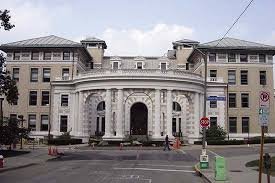Carnegie Mellon University (CMU), located in Pittsburgh, Pennsylvania, is renowned for its rigorous academic programs, groundbreaking research, and a strong emphasis on innovation and creativity. Established in 1900 by industrialist and philanthropist Andrew Carnegie, CMU has grown into a global leader in education and research, consistently ranked among the top universities in the world.
History and Legacy
Carnegie Mellon University began as the Carnegie Technical Schools, aimed at providing vocational training to the working-class population of Pittsburgh. In 1912, it became the Carnegie Institute of Technology, reflecting its expanded academic mission. The merger with the Mellon Institute of Industrial Research in 1967 led to the formation of Carnegie Mellon University, blending Carnegie’s focus on practical education with the Mellon’s emphasis on scientific research.
Read More: The Evolution of Digital Banking: Impact on Loans, Mortgages, and Insurance Services
Academic Excellence
Carnegie Mellon University is organized into seven colleges and schools, each offering a range of undergraduate, graduate, and doctoral programs:
- College of Engineering: Known for its cutting-edge research and innovation, particularly in fields like robotics, artificial intelligence, and cybersecurity.
- School of Computer Science: Consistently ranked among the top computer science programs globally, with pioneering contributions to machine learning, human-computer interaction, and software engineering.
- Tepper School of Business: Offers highly regarded programs in business administration, economics, and entrepreneurship.
- College of Fine Arts: Includes programs in architecture, art, design, drama, and music, fostering a vibrant and creative community.
- Dietrich College of Humanities and Social Sciences: Provides a diverse range of programs in fields such as psychology, economics, and social and decision sciences.
- Mellon College of Science: Focuses on fundamental and applied sciences, including biological sciences, chemistry, mathematics, and physics.
- Heinz College of Information Systems and Public Policy: Specializes in public policy, information systems, and management.
Read More: Financial Preparedness: Emergency Funds, Insurance, and Loan Management
Research and Innovation
Carnegie Mellon University is a powerhouse of research and innovation, attracting significant funding from government agencies, private industry, and philanthropic organizations. The university’s collaborative approach to research fosters interdisciplinary projects that address complex global challenges. Some notable research areas include:
- Artificial Intelligence and Robotics: Home to the world-renowned Robotics Institute, CMU is at the forefront of AI and robotics research, developing technologies that are transforming industries from healthcare to autonomous vehicles.
- Computer Science: Carnegie Mellon University contributions to computer science are unparalleled, with groundbreaking work in fields like natural language processing, cybersecurity, and computational biology.
- Environmental Science and Sustainability: Research at CMU addresses critical issues like climate change, renewable energy, and sustainable urban development.
- Human-Computer Interaction: The Human-Computer Interaction Institute at CMU explores how people interact with technology, leading to innovations in user experience and design.
Campus and Facilities
Carnegie Mellon University campus in Pittsburgh is a blend of historic and modern architecture, featuring state-of-the-art facilities that support its academic and research missions. Key facilities include:
- The Gates and Hillman Centers: Home to the School of Computer Science, these interconnected buildings provide cutting-edge research and teaching spaces.
- The Tepper Quad: A hub for the Tepper School of Business, offering advanced classrooms, collaboration spaces, and innovation labs.
- The Cohon University Center: A central gathering place for students, featuring recreational facilities, dining options, and spaces for student organizations and events.
- The Carnegie Mellon Libraries: Providing extensive resources and services to support research and learning across disciplines.
Read More: Universal Design for Learning: Creating Inclusive Educational Environments
Global Impact
Carnegie Mellon University influence extends far beyond its Pittsburgh campus, with global initiatives and partnerships that enhance its educational and research missions. The university has campuses in Silicon Valley and Qatar, and collaborations with institutions and industries worldwide. These global connections provide students and faculty with opportunities to engage in international research, study abroad programs, and cross-cultural exchanges.
Student Life and Community
CMU boasts a vibrant and diverse student community, with students from all 50 U.S. states and over 100 countries. The university offers a rich array of extracurricular activities, including more than 300 student organizations, competitive sports teams, and arts and cultural events. The emphasis on interdisciplinary collaboration and innovation fosters a dynamic environment where students are encouraged to pursue their passions and make meaningful contributions to society.
Notable Alumni
CMU’s alumni network includes leaders and innovators in various fields, such as:
- John Nash: Nobel Prize-winning mathematician whose life inspired the film “A Beautiful Mind.”
- James Gosling: Creator of the Java programming language.
- Holly Hunter: Academy Award-winning actress.
- Andy Warhol: Iconic artist and a leading figure in the visual art movement known as pop art.
- Judith Resnik: NASA astronaut and engineer.
Conclusion
Carnegie Mellon University stands as a beacon of excellence in education, research, and innovation. Its commitment to interdisciplinary collaboration, cutting-edge research, and fostering a diverse and inclusive community ensures that CMU will continue to make significant contributions to the world. Whether in the arts, sciences, engineering, or business, CMU graduates are well-equipped to lead and innovate in their respective fields, embodying the university’s motto: “My heart is in the work.


